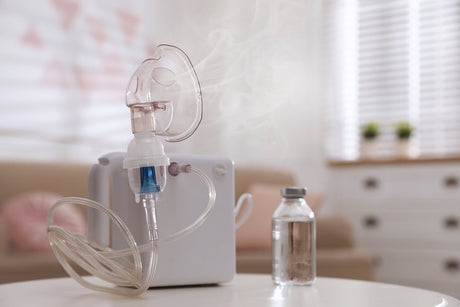If you've ever experienced a sudden feeling of intense heat that makes your face flush, your heart race, and your sweat glands work overtime, you may have had a hot flash. Hot flashes are one of the most common symptoms of menopause, affecting up to 75% of women in the US, although hot flashes in men also occur. But what are hot flashes, what causes them, and how can you treat them? In this article, we'll answer all these questions and more, so you can understand what's happening to your body and how to cope with it.
Hot flashes and temperature control
Hot flashes are episodes of intense heat that usually last from a few seconds to a few minutes. They can occur at any time of the day or night but are more common at night. Hot flashes can affect your face, neck, chest, back, arms, or the whole body. They can make you feel sweaty, dizzy, nauseous, anxious, or irritable. Some people also experience palpitations, chills, or shivering after a hot flash.
Hot flashes are not dangerous, but they can be very uncomfortable and disruptive to your daily life. They can interfere with your sleep quality, mood, concentration, and productivity. They can also affect your self-esteem and confidence, especially if they happen in public or at work.
What are hot flashes causes?
The exact cause of hot flashes is not fully understood, but in women, it is believed to be related to hormonal changes that occur during menopause. Menopause is the natural transition that marks the end of your reproductive years. It usually happens between the ages of 45 and 55, but it can vary from person to person.
During menopause, your ovaries stop producing estrogen and progesterone, the hormones that regulate your menstrual cycle and fertility. This causes the levels of these hormones to fluctuate and eventually decline. These hormonal changes can affect your brain's temperature regulation system, which controls how your body responds to heat and cold.
Normally, when your body gets too hot, your brain sends signals to your blood vessels to dilate (widen) and release heat through your skin. This helps you cool down and maintain a stable body temperature. However, when your hormone levels are low or unstable, your brain may misinterpret these signals and think that you are too hot even when you are not. This triggers a hot flash, which is your body's attempt to cool down by increasing blood flow and sweating.
What factors can trigger or worsen hot flashes?
While hormonal changes are the main cause of hot flashes, other factors can trigger or worsen them. These include:
- Stress: Stress can increase your cortisol levels, which can affect your hormone balance and temperature regulation.
- Emotions: Strong emotions such as anger, anxiety, fear, or excitement can trigger a hot flash by activating your sympathetic nervous system (the "fight-or-flight" response).
- Alcohol: Alcohol can dilate your blood vessels and increase blood flow to your skin, which can make you feel hotter.
- Caffeine: Caffeine can stimulate your nervous system and raise your heart rate and blood pressure, which can also make you feel hotter.
- Spicy foods: Spicy foods can activate receptors in your mouth that signal heat to your brain, which can trigger a hot flash.
- Smoking: Smoking can constrict your blood vessels and reduce blood flow to your skin, which can make you feel colder. This can cause your brain to overcompensate by increasing blood flow and triggering a hot flash.
- Medications: Some medications such as antidepressants, antihistamines, steroids, or opioids can affect your hormone levels or interfere with your temperature regulation.
- Medical conditions: Some medical conditions such as thyroid disorders, infections, diabetes, or cancer can cause hot flashes as a side effect or symptom.
Hot Flashes treatments
There is no cure for hot flashes, but there are ways to manage them and reduce their frequency and severity. Some of the most common treatments include:
Hormone therapy: Hormone therapy involves taking estrogen or a combination of estrogen and progesterone to replace the hormones that your ovaries no longer produce. This can help balance your hormone levels and reduce hot flashes. However, hormone therapy is not suitable for everyone and may have some risks and side effects such as breast cancer or blood clots. You should consult with your doctor before starting hormone therapy and weigh the benefits and risks carefully.
Non-hormonal medications: Non-hormonal medications such as antidepressants (e.g., venlafaxine), anti-seizure drugs (e.g., gabapentin), or blood pressure drugs (e.g., clonidine) can help reduce hot flashes by affecting the chemicals in your brain that regulate temperature. These medications may have some side effects such as drowsiness, dry mouth, or weight gain. You should consult with your doctor before taking any of these medications and follow the dosage and instructions carefully.
Natural remedies: Natural remedies such as herbal supplements (e.g., black cohosh, soy, red clover), acupuncture, hypnosis, or meditation can help reduce hot flashes by influencing your hormone levels or relaxing your mind and body. However, the effectiveness and safety of these remedies are not well-studied and may vary from person to person. You should consult with your doctor before using any of these remedies and be aware of possible interactions or allergies.
Lifestyle changes: Lifestyle changes such as avoiding triggers, dressing in layers, using fans or air conditioners, drinking cold water, exercising regularly, eating a balanced diet, quitting smoking, reducing alcohol and caffeine intake, and managing stress can help reduce hot flashes by improving your overall health and well-being. These changes can also benefit your mood, sleep quality, energy levels, and cardiovascular health.
Technological advances: The use of technologies like the Embr Wave 2 bracelet can help cool down select parts of the body (in this case the temperature-sensitive inner wrist) to offer overall relief during a hot flash.
Living with hot flashes
While these hormone-induced flashes can be uncomfortable, for many they are a passing phase and can be managed through various lifestyle changes. While there's no cure, they can be managed with hormone therapy, non-hormonal medications, natural remedies, and lifestyle changes. If recurring hot flashes are becoming a concern, reach out to your healthcare provider for advice and assistance on how best to manage them
FAQS
How do I know if I'm having a hot flash?
Knowing if you're having a hot flash involves recognizing certain symptoms. These typically include a sudden feeling of warmth, often in the upper body like the face, neck, chest, or back, along with reddening skin and sweating, which is especially common if the hot flash occurs during sleep. Many women experience a rapid heartbeat during a hot flash and may feel anxious or irritable. After the hot flash, some women experience chills or shivering.
What age do hot flashes start?
Hot flashes usually start in women between the ages of 45 and 55, aligning with the onset of menopause. However, the exact age can vary significantly, with some women experiencing them as early as their late 30s or 40s, especially during perimenopause, the transition period before menopause.
What can cause hot flushes other than menopause?
Apart from menopause, hot flushes can be caused by a variety of factors. Hormonal fluctuations, not exclusive to menopause and including conditions like pregnancy or thyroid imbalances, can trigger them. Certain medications, particularly those used for breast cancer, might induce hot flashes. Lifestyle factors such as alcohol consumption, caffeine, and spicy foods are known triggers. Medical conditions like hyperthyroidism, certain cancers, and infections can also cause hot flushes, and emotional states like stress and anxiety can induce a physical response similar to hot flashes.
As a leading supplier of durable and home medical equipment (DME and HME), ApriaHome sources and distributes a wide range of treatment solutions, including home medical equipment and monitoring solutions.
We're here to support you as you work toward your improved health and well-being. We strive to meet your ever-evolving healthcare requirements with individualized attention and premium quality treatment solutions.
Looking to add medical supplies? Browse our premium solutions and let us help you get the most out of every day.
Looking for advice? Our helpful agents are on call at (800) 780-1508 between 8:00 am - 10:00 pm EST daily. Get in touch today.





